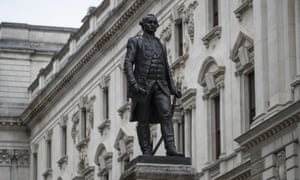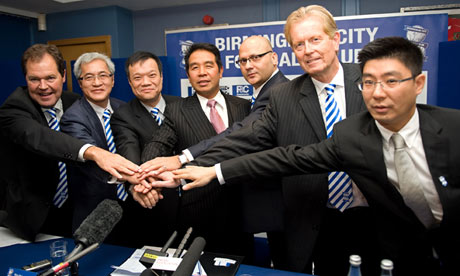The statue of Robert Clive stands outside the Foreign Office. Photograph: Dan Kitwood/Getty Images
When Robert Clive, who established British rule in India, died by his own hand in 1774, he was widely reviled as one of the most hated men in England.
His body was buried in a secret night-time ceremony, in an unmarked grave, without a plaque. Clive left no suicide note, but Samuel Johnson reflected the widespread view as to his motives: Clive “had acquired his fortune by such crimes that his consciousness of them impelled him to cut his own throat”.
Clive’s death followed soon after two whistleblowers had revealed the scale of the devastation and asset-stripping of Bengal under his rule. “We have murdered, deposed, plundered and usurped,” wrote Horace Walpole. “Say what think you of the famine in Bengal, in which three millions perished, being caused by a monopoly of the provisions by the East India Company?” That summer, a satire was published in London lampooning Clive as Lord Vulture, an unstable imperial harpy, “utterly deaf to every sentiment of justice and humanity… whose avarice knows no bounds”.
Clive was hauled before parliament with calls to strip him of both his peerage and his wealth. The select committee found, in addition to lucrative insider dealing, that “presents” worth over £2m had been distributed in Bengal, and recommended that the “very great sums of money … appropriated” by Clive and his henchmen be reimbursed. Despite escaping formal censure, Clive came to be seen as the monstrous embodiment of the East India Company’s violence and corruption.
But just as statues of defeated Confederate generals rose in the southern United States, long after their deaths, as totems to a white supremacy that was felt to be under threat during the civil rights movement, so, in due course, Clive was subject to an equally remarkable metamorphosis: in the early 20th century, as resistance was beginning to threaten the foundations of the Raj, Lord Vulture was miraculously transformed into the heroic Clive of India. Like the erection of the Confederate statues, even at the time it was a deeply controversial matter.
When Robert Clive, who established British rule in India, died by his own hand in 1774, he was widely reviled as one of the most hated men in England.
His body was buried in a secret night-time ceremony, in an unmarked grave, without a plaque. Clive left no suicide note, but Samuel Johnson reflected the widespread view as to his motives: Clive “had acquired his fortune by such crimes that his consciousness of them impelled him to cut his own throat”.
Clive’s death followed soon after two whistleblowers had revealed the scale of the devastation and asset-stripping of Bengal under his rule. “We have murdered, deposed, plundered and usurped,” wrote Horace Walpole. “Say what think you of the famine in Bengal, in which three millions perished, being caused by a monopoly of the provisions by the East India Company?” That summer, a satire was published in London lampooning Clive as Lord Vulture, an unstable imperial harpy, “utterly deaf to every sentiment of justice and humanity… whose avarice knows no bounds”.
Clive was hauled before parliament with calls to strip him of both his peerage and his wealth. The select committee found, in addition to lucrative insider dealing, that “presents” worth over £2m had been distributed in Bengal, and recommended that the “very great sums of money … appropriated” by Clive and his henchmen be reimbursed. Despite escaping formal censure, Clive came to be seen as the monstrous embodiment of the East India Company’s violence and corruption.
But just as statues of defeated Confederate generals rose in the southern United States, long after their deaths, as totems to a white supremacy that was felt to be under threat during the civil rights movement, so, in due course, Clive was subject to an equally remarkable metamorphosis: in the early 20th century, as resistance was beginning to threaten the foundations of the Raj, Lord Vulture was miraculously transformed into the heroic Clive of India. Like the erection of the Confederate statues, even at the time it was a deeply controversial matter.
In 1907 the former viceroy, Lord Curzon, recently returned from India, threw his weight behind a campaign to erect a memorial to “the Victor of [the battle of] Plassey”. His successor, Lord Minto, already dealing with the serious unrest caused by Curzon’s partition of Bengal, was horrified at the proposal, and called it “needlessly provocative”. The secretary of state for India, outside whose office the statue was to be raised, wearily agreed with Minto and wrote that he was beginning to wish that Clive had been defeated at Plassey.
Today Clive’s statue stands outside the Foreign Office at the very centre of British government, just behind Downing Street. Yet clearly this is not a man we should be honouring today. If at the time many thought the statue should never have been erected, now, as we stand at this crucial crossroads after the toppling of Edward Colston, the moment has definitely come for it to be sent to a museum. There it can be used to instruct future generations about the darkest chapters of the British past.
It is not just that this statue stands as a daily challenge to every British person whose grandparents came from the former colonies. Perhaps more damagingly still, its presence outside the Foreign Office encourages dangerous neo-imperial fantasies among the descendants of the colonisers.
In Britain, study of the empire is still largely absent from the history curriculum. This still tends to go from the Tudors to the Nazis, Henry to Hitler, with a brief visit to William Wilberforce and Florence Nightingale along the way. We are thus given the impression that the British were always on the side of the angels. We remain almost entirely ignorant about the long history of atrocities and exploitation that accompanied the building of our colonial system. Now, more than ever, we badly need to understand what is common knowledge elsewhere: that for much of history we were an aggressively racist and expansionist force responsible for violence, injustice and war crimes on every continent.
We also need to know how far the British, every bit as much as the Germans, helped codify a system of scientific racism, creating a hierarchy of race that put white Caucasians at the top and blacks, “wandering Jews” and Indian Muslims at the bottom. Yet while the Germans have faced up to the darkest periods of their past, and are taught about it unvarnished in their schools, we have not even made a start to this process. Instead, while we understand that the Belgian and German empires were deeply sinister, the Raj, we like to believe, was like some enormous rose-tinted Merchant Ivory film writ large over the plains of Hindustan, all parasols and Simla tea parties, friendly elephants and handsome, croquet-playing maharajahs.
This has become a real problem. Our vast ignorance of everything that is most uncomfortable about our imperial past is damaging, every day, our relations with the rest of the world. In particular our misplaced nostalgia for our imperial past is encouraging us to overplay our Brexit hand. Contrary to fantasies of Brexiters, our former colonies are not about to warmly embrace us. Nor can we kickstart the empire, as if it were some sort of old motorbike that has been left in a garage for 70 years. The strategy of trying to strike trade deals with Commonwealth countries - dubbed Empire 2.0 by some in the Civil Service – has been a total failure.
Indians, in particular, have bitter memories of British rule. In their eyes we came as looters, and subjected them to centuries of humiliation. The economic figures speak for themselves. In 1600, when the East India Company was founded, Britain was generating 1.8% of the world’s GDP, while India was producing 22.5%. By the peak of the Raj, those figures had more or less been reversed: India was reduced from the world’s leading manufacturing nation to a symbol of famine and deprivation.
Removing the statue of Clive from the back of Downing Street would give us an opportunity finally to begin the long overdue process of education and atonement. In 1947, at the end of the Raj, Indians removed all their imperial statues to suburban parks where explanatory texts gave them proper historical context. We could do the same. Alternately, by placing Clive and others of his ilk in a museum, perhaps one modelled on the brilliantly nuanced and hugely moving National Museum of African American History & Culture in Washington DC, we can finally begin to face up to what we have done and so begin the process of apologising for the many things we need to apologise for. Only then will we properly be able to move on, free from the heavy baggage of our imperial past.



